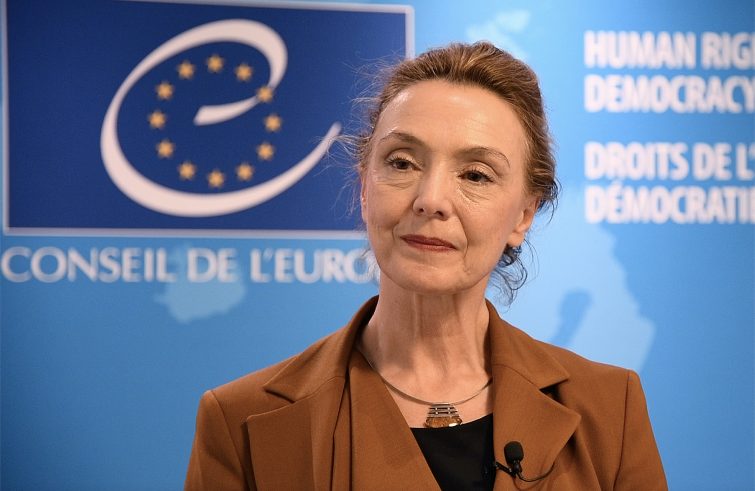
The war in Ukraine, protecting and promoting human rights and the rule of law, the global challenges caused by climate change, migration, digital innovation, artificial intelligence… These are some of the topics that will be addressed at the Reykjavík Summit organised by the Council of Europe. The Heads of State and Government of its 46 member countries will convene in Iceland’s capital on May 16-17 to discuss the future of the Council of Europe, Europe’s first supranational institution, founded in 1949, which promotes peace, democracy, the rule of law and protection of fundamental rights (through the Court of Human Rights).
SIR met with the Secretary General of the organisation, Marija Pejčinović Burić, on the eve of the summit in Strasbourg. Marija Pejčinović Burić was born in Mostar (Bosnia-Herzegovina) in 1963, is of Croatian nationality, she graduated from the University of Zagreb and the College of Europe in Bruges. She began her position as Secretary General of the Council of Europe in 2019, after having held important political-institutional and governmental positions in Croatia.
“Thank you for your interest in the Council of Europe and the Summit,” she said in the video interview. “Throughout the long history of the Coucil of Europe, in its 74 years of existence, the Reykjavík Summit will be only its fourth summit, which explains why it is so important for the Council of Europe to hold this Summit at this specific moment in history.”
“It is important to deliver results that will steer the Council of Europe through this period of major transformations, identifying the CoE’s political agenda for the future.”
“For us – remarked the Secretary General – the Summit should identify the response to several questions. The first concerns the challenge of the war in Ukraine, how to help Ukraine, and how the responsibilities for the ongoing war of aggression are to be determined. It is equally necessary to reaffirm our commitment to the values of the Council of Europe, given the signs of democratic backsliding; human rights and the rule of law are being challenged in some parts of Europe.”
Pejčinović Burić pointed out: “If in the future we want to avoid having to face situations in which a country is forced to leave the Council of Europe because it fails to respect its regulations, and if we want to make sure that the Russian Federation is the last country expelled from the Council”, following the aggression against Ukraine, “the commitment based on shared fundamental values and regulations definitely needs to be reconfirmed. We expect that the leaders attending the Summit will pledge to do so, ensuring that the Council of Europe’s core values and norms are respected by its member States.”
“Secondly, it is important to address the challenges in the area of new technologies, linked, for example, to artificial intelligence and human rights. It is necessary to step up efforts with regard to climate change and human rights. Today we face a situation in which several national and international tribunals are deliberating on these issues,” she added. “The Court of Human Rights in Strasbourg alone has so far to decide on 300 proceedings on this subject.”
The Secretary General explained that it is “equally necessary to reflect on ways in which the Council of Europe can cooperate with other international organisations, notably with the European Union, with OEEC and with the United Nations. We live in a globalised world, marked by global challenges, thus all our strengths and synergies must be pooled and we must work together.”
The Summit in Iceland “will be attended also by high-ranking representatives of the European Union. This is very revealing about our present moment in Europe, where the two Organisations, which originated from the same values, continue working together” for the great project of peace, the Secretary General pointed out.
“I hope that unity will be high on the Summit’s agenda. Unity in the face of the challenges of the war in Ukraine and unity also regarding the values we hold dear, enshrined in the 223 Conventions of the Council of Europe, notably in what I call ‘the mother of all Conventions’: the European Convention on Human Rights”.
“I hope – Marija Pejčinović Burić concluded – that after the Summit we will see a greater degree of compliance with the Council of Europe’s provisions at the international level, first of all by implementing the decisions of the European Court of Human Rights.”










